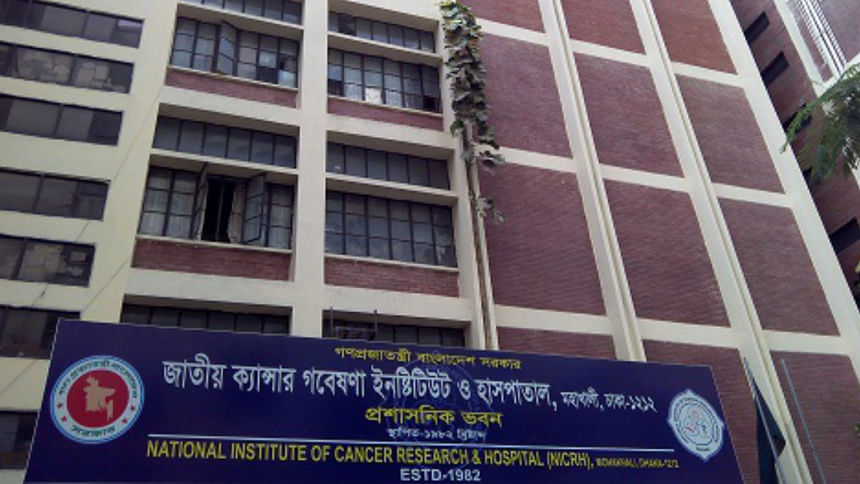No radiotherapy at lone cancer hospital for 44 days

All six radiotherapy machines of the National Institute of Cancer Research & Hospital (NICRH) have been out of order for the last 44 days, depriving more than 10,000 cancer patients of their scheduled therapy.
Amid this sorry state of radiotherapy at the country's lone full-fledged cancer treatment facility, Bangladesh is set to observe World Cancer Day today.
The exact number of people suffering from cancer in Bangladesh is hard to get as there is no official data.
However, according to the population-based cancer registry by the Bangabandhu Sheikh Mujib Medical University (BSMMU)'s Department of Public Health and Informatics, the prevalence of cancer in Bangladesh is 106 cases per 100,000 population.
A recent study by the BSMMU revealed that 53 new cases are reported per 100,000 people every year and cancer is responsible for 11.9 percent of all deaths in Bangladesh annually.
During a visit to the NICRH yesterday morning, cleaners and staff were seen cleaning floors and doing paint touch-ups ahead of the cancer day event.
A notice was seen in the radiotherapy department announcing that the machines were out of order. There was no mention of when they might be operational and patients were told they would be contacted later when the machines start working again.
Of the six, two medical Linear Accelerators (LINACs), the device most commonly used for external beam radiation treatments for cancer patients, became non-functional two years ago.
A year ago, two cobalt machines -- teletherapy machines used for treating localised solid tumours, such as cancers of the skin, tongue, larynx, brain, breast, or uterine cervix -- broke down.
Since then, the two remaining LINACs were used beyond their capacities for approximately 220-230 patients every day, until they recently became nonfunctional.
One of the machines malfunctioned during a therapy session on December 21 last year.
The other stopped working the following day, halting all radiotherapy services at the state-run facility.
The hospital has been unable to provide radiotherapy services, forcing around 220-230 cancer patients to return home without the therapy every day, said NICRH Director Jahangir Kabir.
However, NICRH bought two brand-new machines.
"We hope that one new machine will start its operation today, and within the first week of March, we will start operating another new machine."
If four more machines can be made operational, NICRH will be able to provide therapy to an additional 600 cancer patients daily, Kabir said.
Noted cancer epidemiologist Md Habibullah Talukder Ruskin considered the shutdown of radiotherapy machines and their prolonged inoperability as a sign of extreme irresponsibility.
"Who will take responsibility for the patients who have been deprived of treatment for so long, those who had to pay more for radiotherapy in private facilities, or perhaps even those who may have died without us knowing?"
The radiotherapy machines at the NICRH were purchased between 2006 and 2008 and those typically have a lifespan of 10 years.
This means their validity expired around 2016-17, he said.
"Those responsible for this dire state of cancer treatment should be identified and held accountable. Why have these machines remained out of order for so long, even as we approach 2025? The country has wasted millions of taka in various ways."
Instead of buying machines separately, all six should have been purchased at once, Ruskin said.
"It's very unfortunate that the machines in this hospital were purchased 10 years ago. Since last July, there has been no project director for the initiative to establish eight cancer hospitals across the country," said Sayedur Rahman, special assistant to the chief adviser for health affairs.
Among the 38 different cancers prevalent in the country, lung cancer (11.4 percent) causes the most deaths, followed by laryngeal cancer (8.5 percent) and stomach cancer (5.7 percent), according to the BSMMU study.

 For all latest news, follow The Daily Star's Google News channel.
For all latest news, follow The Daily Star's Google News channel. 






Comments